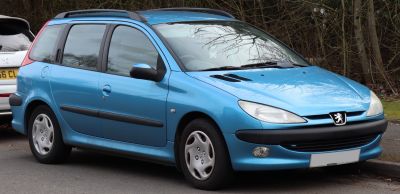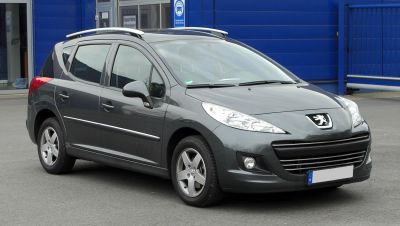 1988 Honda Civic IV Shuttle Dimensions, Size & Specs
1988 Honda Civic IV Shuttle Dimensions, Size & SpecsMeasurements of the 1988 Honda Civic IV Shuttle, engineered for optimal performance and comfort
| Dimensions | |
|---|---|
| Length: | 4105 mm161.6 in13.5 ft |
| Width: | 1690 mm66.5 in5.5 ft |
| Height: | 1515 mm59.6 in5.0 ft |
| Weight Specifications | |
| Curb Weight: | 1160 kg2557 lbs |
| Tire Specifications | |
| Tire Size: |
|
The Honda Civic IV Shuttle, produced from 1988 to 1991, is a practical station wagon variant of the fourth-generation Civic lineup. Designed to offer additional cargo space and versatility compared to the standard Civic hatchback and sedan, the Shuttle combined compact exterior dimensions with a functional interior layout. The vehicle measured 4105 mm (161.6 inches) in length, offering a balanced footprint that is easy to maneuver in urban settings while maximizing interior room. With a width of 1690 mm (66.5 inches) and a height of 1515 mm (59.6 inches), the Civic IV Shuttle maintained a low and practical stance typical of late 1980s wagons. Weighing 1160 kg (2557 lbs) in curb weight, it was relatively light, contributing to efficient fuel economy and agile handling. The Shuttle rode on 185/60 R13 tires, a compact tire size that supported a comfortable ride and responsive steering. This generation of the Civic Shuttle is noted for its reliable engineering, modest dimensions, and utility, appealing to drivers seeking a balance between economy and functionality in a station wagon format during the late 1980s and early 1990s.
Discover the standout features that make the 1988 Honda Civic IV Shuttle a leader in its class
Have a question? Please check our knowledgebase first.
The 1988-1991 Honda Civic IV Shuttle features a length of 4105 mm (161.6 inches), a width of 1690 mm (66.5 inches), and a height of 1515 mm (59.6 inches). These dimensions make the Civic IV Shuttle a compact station wagon with a balanced size suitable for urban driving and practical interior space, offering ease of parking and maneuverability in tight city environments while maintaining sufficient cargo and passenger room.
The curb weight of the Honda Civic IV Shuttle is 1160 kg (2557 lbs). This relatively lightweight design contributes positively to the vehicle’s fuel efficiency, handling, and acceleration. A lower curb weight typically means better agility and easier braking, making the Civic IV Shuttle responsive and economical to drive, especially advantageous in urban and suburban settings common for station wagons.
Yes, the Honda Civic IV Shuttle fits comfortably into a standard residential garage. With its length of 4105 mm (161.6 inches), width of 1690 mm (66.5 inches), and height of 1515 mm (59.6 inches), it occupies a footprint well within typical garage dimensions, which usually range from about 2400 mm (96 inches) to 3000 mm (120 inches) in width and 4800 mm (189 inches) to 6000 mm (236 inches) in length. This ensures hassle-free parking and protection from weather elements.
Compared to the third-generation Honda Civic Wagon, the Civic IV Shuttle generally maintained a similar footprint but introduced slight increases in length, width, and height for better interior space and improved cargo capacity. The Civic III Wagon was typically a bit shorter and narrower, which made the Civic IV Shuttle a bit more spacious and comfortable, reflecting Honda’s evolution toward enhanced versatility and family usability in the late 1980s.
The Honda Civic IV Shuttle is equipped with 185/60 R13 tires. The tire width of 185 mm combined with a sidewall height corresponding to 60% of the tire's width balances ride comfort with handling responsiveness. The 13-inch wheel diameter is smaller than modern vehicles but typical for compact cars of the era, contributing to a softer ride by absorbing bumps effectively, though with more limited high-speed cornering capacity compared to larger wheels.
The Civic IV Shuttle offers competitive interior space for its class, combining compact external dimensions with clever packaging that optimizes passenger comfort and cargo versatility. Compared with contemporaries like the Toyota Corolla wagon or Mazda 323 wagon, the Civic IV Shuttle’s well-designed cabin and rear cargo area provide ample room for families and luggage, making it an attractive option for those needing practical daily transportation with loading flexibility during the late 1980s.
The Honda Civic IV Shuttle is praised for its reliability, fuel efficiency, and build quality, which were standout features at the time. Compared to rivals like the early Ford Escort Wagon or Volkswagen Golf Variant, the Civic Shuttle often delivered better mileage and lower maintenance costs. Its compact size combined with practical cargo space gave it a unique edge for drivers seeking a dependable and economical station wagon with the hallmark Honda engineering of the late 1980s.
The Civic IV Shuttle stands at 1515 mm (59.6 inches) tall, which contributes to a relatively low center of gravity and stable on-road behavior. This height supports ease of entry and exit for passengers while preserving a wagon-style profile that balances interior headroom with aerodynamic efficiency. The modest height ensures good visibility for the driver and fits well within parking structures and carports common in residential and commercial areas.
With a width of 1690 mm (66.5 inches), the Civic IV Shuttle is well-suited for urban driving environments where narrow streets and tight parking spots are common. This relatively narrow stance aids maneuverability and ease of parking, making it easier to navigate in congested areas compared to wider vehicles. Despite its compact width, the cabin is efficiently arranged to provide sufficient interior space for passengers and cargo without sacrificing street agility.
The dimensions of the Civic IV Shuttle—4105 mm (161.6 inches) in length, 1690 mm (66.5 inches) width, and 1515 mm (59.6 inches) height—strike a balance between compactness and practicality making it ideal for family use. These measurements allow for comfortable seating for passengers while providing ample cargo capacity for groceries, sports gear, or luggage. Its size enables easy driving and parking in urban and suburban areas, supporting the versatile transportation needs of families during the late 1980s and early 1990s.
Discover similar sized cars.

| Production: | 2002-2007 |
|---|---|
| Model Year: | 2002 |
| Length: | 4028 mm158.6 in |
| Width: | 1652-1673 mm65.0-65.9 in |
| Height: | 1430-1460 mm56.3-57.5 in |

| Production: | 2009-2013 |
|---|---|
| Model Year: | 2009 |
| Length: | 4164 mm163.9 in |
| Width: | 1972 mm77.6 in |
| Height: | 1527 mm60.1 in |

| Production: | 2007-2009 |
|---|---|
| Model Year: | 2007 |
| Length: | 4156 mm163.6 in |
| Width: | 1972 mm77.6 in |
| Height: | 1527 mm60.1 in |

| Production: | 2013-2018 |
|---|---|
| Model Year: | 2013 |
| Length: | 4084 mm160.8 in |
| Width: | 1700 mm66.9 in |
| Height: | 1504 mm59.2 in |

| Production: | 2002-2005 |
|---|---|
| Model Year: | 2003 |
| Length: | 4053 mm159.6 in |
| Width: | 1660 mm65.4 in |
| Height: | 1437 mm56.6 in |

| Production: | 2002-2005 |
|---|---|
| Model Year: | 2003 |
| Length: | 4053 mm159.6 in |
| Width: | 1660 mm65.4 in |
| Height: | 1437-1450 mm56.6-57.1 in |
